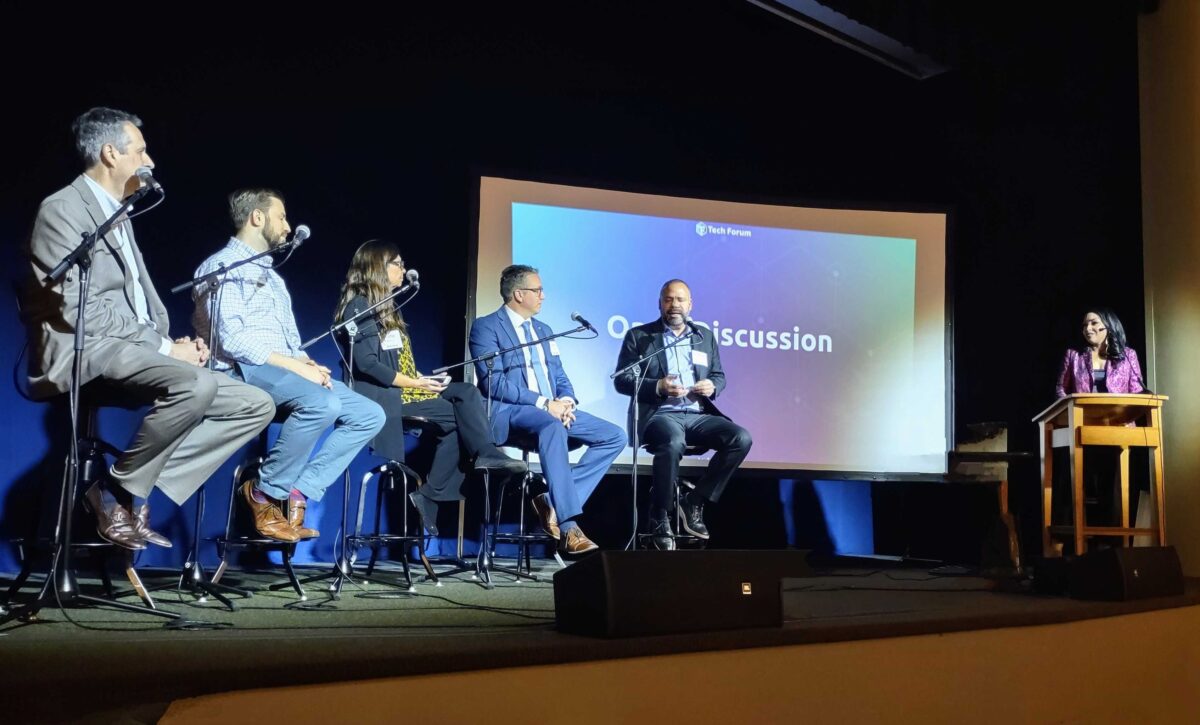You may think artificial intelligence isn’t a big part of your life — maybe you’ve avoided the ChatGPT hype and you’re not interested in generating AI art. Maybe you’re against using AI at all, even if it means skipping online chats with a customer service bot in favor of waiting on hold to talk to a person.
In reality, avoiding AI is futile. You interact with it every day whether you want to or not, and you don’t even notice it.
Five Delaware speakers from five different industries in the public, private and nonprofit sectors came together on Wednesday for Tech Forum’s “AI in DE” event at Theatre N and Zip Code Wilmington, shining a light on some of the ways AI is, or will be, used in the state.
How the State of Delaware uses AI
Delaware CIO Jason Clarke explained Delaware roads are monitored by cameras that DelDOT uses to manage traffic patterns based on work zones, accidents and severe weather conditions. At one time the number of cameras was low enough that people could do all of the monitoring. Not anymore; there are too many screens for people to efficiently keep track of them all. But AI can instantly alert human monitors to issues picked up on camera because it “sees” them as they’re happening.
AI also protects you from cybercrime. In the last quarter of 2022, more than 500 billion cyber threats to the state were blocked, per Clarke. More potentially threatening were the 185,000 threats that made it through, a group Clarke compared to minors with fake IDs who made it past the bouncer. The state relies on AI to identify those as threats, leaving a manageable number to be further investigated by human teams.
“In the past, we’ve always been in a position where we could add something to the list,” Clarke said. “We block it, no problems, right? But these things are happening so fast that, in today’s environment, that is not an option. One of the benefits that comes with these tools is that they actually are learning themselves and they’re able to pick up on trends. And they’re much faster than anything we could do in the context of being able to engage and help prevent these activities.”
How else is AI being applied in Delaware?
These speakers also presented on their work with AI:
- DuPont’s director of digital innovation, data and analytics, Bernardo Tiburcio, talked about smart demand forecasting. That includes how machinery is monitored by AI sensors to catch issues, such as leaks, from becoming unsafe and costly problems while increasing profitability.
- If you find yourself needing the services of a nonprofit, AI is helping them get the right resources to the right people at the right time, so you’re less likely to be left behind. Ryan Harrington and the Data Innovation Lab are at the forefront of helping Delaware nonprofits use technology including AI to be as efficient as they can be.
- AI can help futurists like Jim Lee predict the stock market, too.
In demand
As an industry itself, AI is a hot one, used in industries including — but far from limited to — fashion design, energy, manufacturing, healthcare, finance and media.
At the University of Delaware, where AI research and development includes 20 departments, seven colleges and 48 faculty members, the number of students in AI-related computer science majors increased from 296 in the fall of 2016 to 791 in the fall of 2022, according to Kathy McCoy, professor and chair of Computer and Information Science at UD. And they’re in demand: Nearly 100% of graduates studying AI get hired soon after entering the job market.
“They seem to be getting snatched up faster than we can produce them,” McCoy said.
Before you go...
Please consider supporting Technical.ly to keep our independent journalism strong. Unlike most business-focused media outlets, we don’t have a paywall. Instead, we count on your personal and organizational support.
3 ways to support our work:- Contribute to the Journalism Fund. Charitable giving ensures our information remains free and accessible for residents to discover workforce programs and entrepreneurship pathways. This includes philanthropic grants and individual tax-deductible donations from readers like you.
- Use our Preferred Partners. Our directory of vetted providers offers high-quality recommendations for services our readers need, and each referral supports our journalism.
- Use our services. If you need entrepreneurs and tech leaders to buy your services, are seeking technologists to hire or want more professionals to know about your ecosystem, Technical.ly has the biggest and most engaged audience in the mid-Atlantic. We help companies tell their stories and answer big questions to meet and serve our community.
Join our growing Slack community
Join 5,000 tech professionals and entrepreneurs in our community Slack today!






